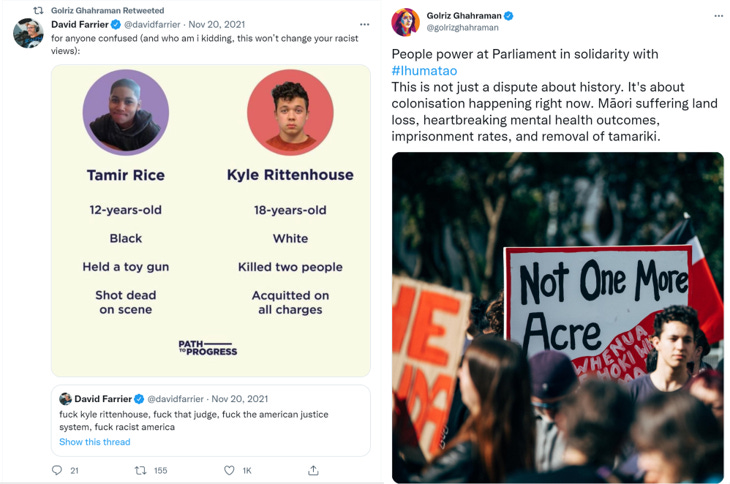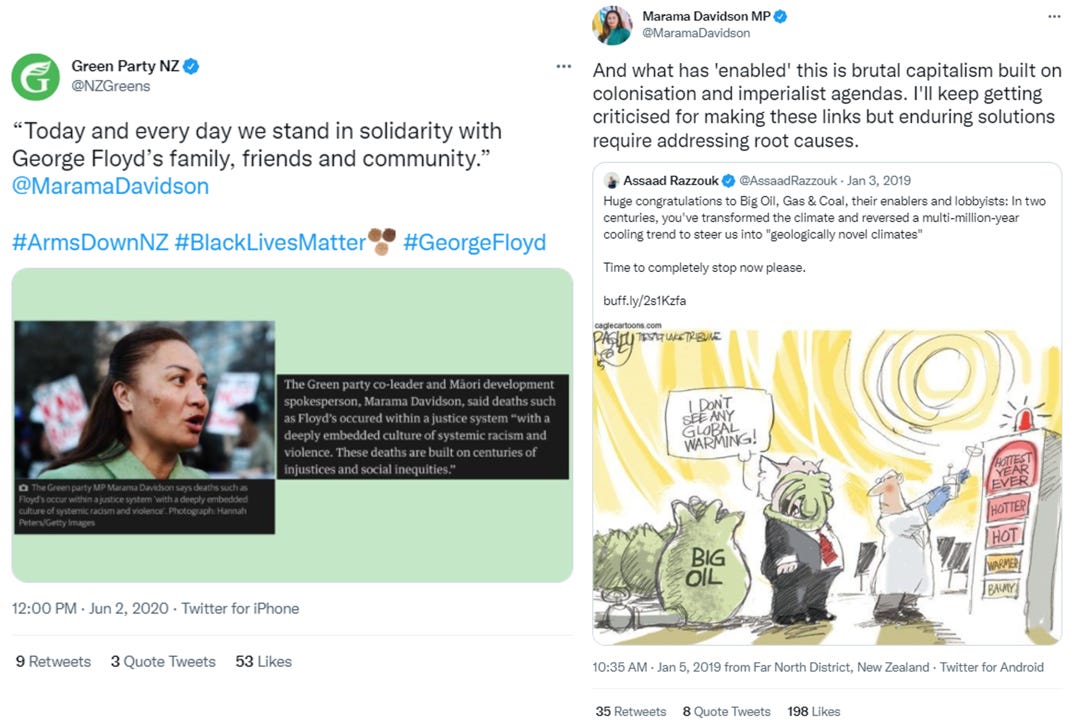The irony of self-inflicted colonisation
Some of colonisation’s staunchest critics are the most enthusiastic importers of distorting issues and ideas.
There’s no good reason for you to know who Kyle Rittenhouse is. If you’re a Kiwi, the trial and acquittal of this teenager who shot three men alongside an anti-racism protest is essentially irrelevant. Yet his name was one of Google New Zealand’s “top trending searches for 2021”, his story was a regular fixture in the New Zealand Herald (and provoked furious denunciation by letter writers) and the jury’s “not guilty” verdict drew the ire and anguish of NZ Twitter. This isn’t just a distraction, it’s an imposition. Our disproportionate focus on overseas events of little to no relevance is a modern and self-inflicted form of colonisation—and, ironically, one that is embraced most enthusiastically and uncritically by some of colonisation’s staunchest critics.
We live in an interconnected world, as the cliché has it; America is a global hegemon, along with China setting the terms of the world order. New Zealand is a price taker; we have to accept at least some of the terms that they and other larger and more powerful nations set. But not so many, and not so uncritically. We inhale overseas cultural products and ideas—particularly those from the US—in areas like politics, media, and entertainment, often with little understanding of what’s involved. To continue with the Rittenhouse example, and for the benefit of the mercifully uninitiated, Rittenhouse joined a group of people intending to protect property alongside protests and riots after the police killing of Jacob Blake. Someone gave him an AR-15 rifle. At one point he was filmed offering medical assistance to protestors. Later he found himself running away from protestors; someone fired a gun into the air, he turned and fired at his pursuers and hit and killed one. More people pursued him, he tripped and fell, and turned and shot two of the chasers, one of whom died. His trial turned on whether he was acting in self-defence—the jury thought he did though as David French explains, Rittenhouse may have been legally in the right but morally in the wrong. His trial by media turned on whether he was a white supremacist. (Rittenhouse and the three men he shot are white.) It’s a tragic situation, and it’s unbelievable to see Rittenhouse elevated to the status of folk hero by parts of the American Right. But rather than grapple with the complexity of the case, most people seem to find it easier and more psychologically satisfying to stick with simplistic narratives about the case and, locally, to import them into an entirely foreign context.

The unthinking embrace of foreign issues and movements distorts our politics in at least two ways. First, it forces our own issues and debates into a foreign frame. For example, in 2020 “thousands of New Zealanders … marched at Black Lives Matter rallies in Auckland, Wellington and Dunedin” to oppose racism and “show solidarity with the movement”. No doubt this is well-intentioned, but the BLM movement arises out of a specifically US history, one that includes slavery, lynching, and segregation. Putting our own history, including our historic injustices, into this frame, distorts it. And when our understanding is misdirected, so is our compassion and our action. Second, it distracts us from our own issues, history and people. Take Dobbs v Jackson Women’s Health Organization, a US Supreme Court case that could overturn the 1973 decision in Roe v Wade that there is a constitutional right to abortion in America. Roe revolves around a set of uniquely US circumstances—a supreme-law constitution, federalism, judicial supremacy—that don’t exist in New Zealand. Despite those differences, there’s a plethora of local articles and commentary on the Dobbs case along with denunciations and pledges to “remain vigilant to ensure a similar path is not taken in Aotearoa.”

That’s not to say all international developments are irrelevant or illegitimate. I’ve been critiquing an unthinking or uncritical embrace, and now it’s time to disentangle that distinction. As I’ve already said, the US is a global hegemon and much of what it does matters. And it’s not just the US; for example, in the two periods I’ve lived in the UK I’ve noticed that their news has a different, more consequential feel to ours, one that’s a product of being in a land that has a genuine role to play on the world stage. So things like America’s foreign policy stance and its military commitments matter; when it decides on a course like withdrawal from Afghanistan, that says something about its ongoing willingness to maintain the pax Americana around the world. Also, because we consume a lot of overseas cultural products, the content of that culture matters at least to the extent that it is shaping our appetites and imagination. We also rely on technology and infrastructure developed overseas—for better and for worse, we’re all living in the FANG universe now—and events that shape how that technology is developed and deployed matter to us. For example, Twitter’s decision to ban President Donald Trump from their platform, and what that means for social media censorship generally, might mean we pay attention to the events that catalysed that decision.
This attempt at disentanglement, I hope, illustrates a way forward, starting by elevating and valuing our own voices. There are good thinkers and speakers out there; seek them out, and be discerning about who you pay attention to. For example, Danyl Mclauchlan is an outstanding thinker and writer, and the journalist Thomas Coughlan writes intelligently and with nuance. Platforms like Substack are also are making it easier for more voices to be heard, though admittedly at an increased risk of cacophony. If you’re not sure how to find people worth listening to, here are two rules of thumb that might help. Look at the people whose judgment you respect and trust, and see who they’re paying attention to. This can lead to an echo chamber though, so supplement it by listening to a selection of people whose views and ideas are different to yours. I suspect my view of life is different from Mclauchlan’s in important respects, but I’m always enriched by reading him.
The second part of that way forward involves thoughtful engagement with the ideas and issues that the world offers us. Let’s take a recent example, the anniversary of the January 6 riots at the US Capitol. On that date in 2021, a mob invaded the US equivalent of our Parliament buildings in the wake of protests against Donald Trump’s election loss. To some, the anniversary and the original events are merely an enjoyable opportunity to sneer at those involved and engage in performative handwringing about US polarisation. More profitably, they can be an opportunity to discern and discuss important constitutional principles and social issues that are as relevant here as they are in America. Overseas examples and trends can also inspire us, not to slavish emulation or uncritical adoption, but to stimulate our thinking and broaden our horizons. For example, the establishment of a new university like UATX might cause us to wonder if tertiary education could be done differently here. And, lastly, some of what’s produced overseas is simply better and more relevant than what’s produced here. Outlets like UnHerd provide a forum for divergent opinions that aren’t present in the turgid uniformity of our mainstream, and publications like The New Atlantis offer a depth and intelligence that’s beyond most of New Zealand’s commentariat.
New Zealand must not become a mere outpost of a homogenous global politics. We should engage with what the world has to offer us when it’s relevant and instructive, especially when it illuminates universal human concerns and broadens our horizons, and we should also invest in our own thinkers and creators. Both those tasks, however, will become harder unless we’re able to resist the lazy importation of irrelevant ideas and issues by the modern-day colonisers in our midst.



As you note, local critics who eagerly seek out "evil colonialisation" in everything they see around them fail to realise how the very ideas and issues they support are clearly colonial. Sad. There are none so enslaved ...